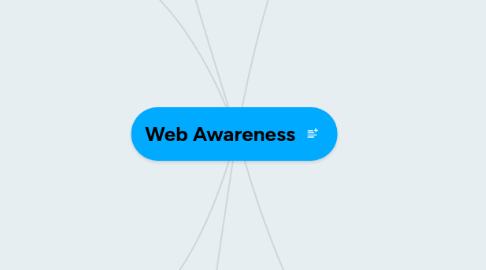
1. Digital Literacy
1.1. Connection
1.1.1. Learning how to
1.1.2. Web awareness
1.2. Collaboration
1.2.1. Working Safely with Others
1.2.2. Ethical Digital Community
1.3. Learning Community
1.3.1. Navigate Information
1.3.2. Confidence & Safety
1.3.3. Ethics
1.4. Information Access
1.4.1. Awareness
1.4.2. Education
1.4.3. Knowledge based
2. Privacy
2.1. Personal Publishing
2.1.1. Copyright
2.1.1.1. Authorship / Fair Use
2.1.1.2. Attribution
2.1.1.3. Creative Commons
2.1.2. Audience
2.1.2.1. Strangers
2.1.2.2. Professional
2.1.2.3. Entertainment
2.1.2.4. Digital Profile
2.1.3. Anonymity
2.1.3.1. Digital Footprint
2.1.4. Permanance
2.1.4.1. Contents is Forever
2.1.5. Free Speech
2.1.5.1. Blogs
2.1.5.2. Forums
2.1.5.3. Social Networking
2.2. Potential Risks & Dangers
2.2.1. Smartphones
2.2.1.1. Geotagging
2.2.1.2. Share Sensitive Info
3. Safety
3.1. Potential Risks
3.1.1. Cyberbullying
3.1.1.1. suicide
3.1.2. Identity Theft
3.1.2.1. credit card fraud
3.1.3. Explicit content
3.1.3.1. good vs. bad images
3.1.3.2. sexual content
3.2. Rights & Responsibilties
3.2.1. Behaving Ethically Online
3.2.1.1. referencing cited information
3.2.2. Balancing Personal Empowerment
3.2.3. Community Well-being
3.3. Parental Supervision
3.3.1. Filters
3.3.2. Privacy Settings
3.3.3. Monitor what kids are doing
4. Digital Footprint
4.1. Sense of Identity
4.1.1. Professional Profile
4.1.2. Entertainment
4.1.3. Personal
4.2. Sense of Privacy
4.2.1. Security
4.3. Ownership & Authorship
4.3.1. Authentic Source
4.3.2. Publishing
4.4. Trustworthiness & Credibility
4.4.1. Authenticity
4.4.2. Evaluation of source
5. Digital Citizenship
5.1. Access
5.1.1. Equal Digital Rights
5.1.2. Digital Exclusion
5.2. Commerce
5.2.1. Illegal Downloading
5.2.2. Pornography
5.2.3. Gambling
5.3. Communication
5.3.1. Email
5.3.2. Cellphones
5.3.3. Instant Messages
5.4. Etiquette
5.4.1. Appropriate Conduct
5.4.2. Responsible Digital Citizenship
5.4.2.1. Netiquette
5.5. Law
5.5.1. Ethical Behaviour
5.5.2. Crime
5.5.2.1. Hacking
5.5.2.2. Plagerizing
5.6. Rights & Responsibilities
5.6.1. Digital Citizen Rights
5.6.1.1. Privacy
5.6.1.2. Free Speech
5.6.2. Addressed, Discussed, Understood
5.7. Security
5.7.1. Virus Protection
5.7.2. Backup of Data
5.7.3. Surge Control
6. Authenticity
6.1. Fact or Folly
6.1.1. Reliable and Valid information
6.1.1.1. Relevancy
6.1.2. Trusted cites
6.1.3. Scams
6.2. Email Validity
6.2.1. Senders and Receivers of information
6.2.1.1. Who are you talking to?
6.2.2. Links to websites
6.2.2.1. Identify keywords
6.2.2.2. Fraud
6.3. Evaluation
6.3.1. Currency
6.3.1.1. dated
6.3.1.2. current
6.3.2. Objective
6.3.3. Coverage
6.3.4. Accuracy
6.3.5. Authority
6.3.5.1. Signed
